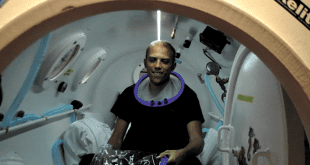By Parveen Vahora, M.D.
It’s known as a “silent killer” because it often goes undiagnosed until the disease state is advanced. If left untreated, ovarian cancer rapidly grows and spreads into the abdominal and pelvic areas.
Today, we’re able to diagnose the initial onset of these symptoms better, as we now know that most of them are directly related to ovarian and reproductive cancers and disorders. However, the key is to make certain that women who are experiencing any of these symptoms go to their physician immediately to be tested.
Symptoms
• Abdominal pain
• Bloating
• Constipation
• Fatigue
• Feeling full
• Heart Burn
• Irregular menstrual cycles
• Nausea
• Painful intercourse
• Pelvic discomfort
• Urinary urgency or frequency
Due to ovarian cancer cell’s rapid growth, if you ‘ve got one or more of the symptoms mentioned above that do not subside, you must seek medical attention quickly.
Common Risk Factors
• Genetics (BRCA1 and BRCA2)
• Family History
• Personal history of cancer
• Endometriosis
• Ovarian cysts
• Reproductive issues
• Infertility
• Hormone replacement therapy
• Being overweight
• Hormonal Imbalance
• Lynch Syndrome
Genetic Risks
Reproductive cancers can be linked to a hereditary genetic mutation called BRCA; this includes breast cancer as well. Although a high percentage of ovarian cancers are genetically passed down, many women with no family history are also at risk for developing ovarian cancer. Lynch Syndrome is also a genetically inherited syndrome that causes various cancers, including bowel, endometrial, and ovarian, as well as other cancerous conditions like colon, stomach and uterine cancers.
According to the National Cancer Institute (NIH), “A woman’s lifetime risk of developing breast and/or ovarian cancer is greatly increased if she inherits a harmful mutation in BRCA1 or BRCA2.
About 1.3% of women in the general population will develop ovarian cancer sometime during their lives (1). By contrast, it is estimated that about 44% of women who inherit a harmful BRCA1 mutation and about 17% of women who inherit a harmful BRCA2 mutation will develop ovarian cancer by the age of 80 (2).”
Testing is CRITICAL
The most common diagnostic testing involves a gynecological examination, transvaginal ultrasound, blood tests for the antigen CA-125 (detects cancer cells), and genetic testing for BRCA1 or BRCA2 mutations
Genetic testing is a cutting-edge medical technique that looks at your unique genetic makeup, and that can be used to see how your DNA might shape your health over the course of your life. A sample of DNA is collected—typically with a small sample of blood or saliva—then analyzed in a lab to look for evidence of genetic disorders or vulnerabilities to some diseases. For example, people with specific gene mutations might develop some cancers earlier in life, or at a higher rate, than the general population. This is precisely the case with BRCA mutations.
If you are predisposed to ovarian cancer or have a family history, Dr. Vahora’s genetic risk panel includes BRCA 1&2, Lynch genes and others that can put you at risk for ovarian, breast and or uterine and colon cancer. Hormone therapy may not be indicated if you are a carrier if these genes or if you have a family history of cancer or have had cancer.
Surgical Intervention
If you have an ovarian cancer diagnosis, Dr. Vahora will work directly with you to discuss the possibility of having an oophorectomy (removal of ovary) on one or both ovaries, which also might include the fallopian tubes, or a full hysterectomy. These precautionary surgeries will reduce your risk of ovarian cancer by approximately 90% and breast cancer by 50%.
If you have your ovaries removed or a hysterectomy, your hormones will become even more imbalanced, which can lead to vaginovulvar atrophy (VVA: dry, painful, condition). Hormone therapy is not always an option and it does not improve VVA; however, an advanced technique that has helped countless women is available. Mona Lisa Touch® is a groundbreaking laser procedure that revitalizes and rejuvenates the vagina.
The laser assists with the bodies cell renewal to regenerate the mucous membrane and help with the restoration of collagen and renewing the proper trophic balance to the membrane. Now it’s possible to have relief from VVA!
Advanced And Individualized Care
The office of Dr. Parveen Vahora is small, intimate, and welcoming. Women under their care are treated with the utmost respect, which means they offer personalized care: educating on conditions and treatment options as well as preventative measures. Their focus is on sexual health—offering MonaLisa Touch® for patients going through menopause as well as post-menopausal women, breast cancer survivors, and those suffering from pain during intercourse or intense dryness. They also offer genetic testing for breast, ovarian, and colon cancer. From birth control to robotic surgery, Dr. Vahora has got you covered.
They follow Enhanced Recovery After Surgery (ERAS®) protocols, which take a comprehensive look at all areas of the patient’s journey through surgery and recovery, creating a well-coordinated, team-oriented approach to surgical care for better outcomes. Weaving this into personalized care plans, Dr. Vahora and her team get patients back to their normal routines faster.
Inspiring Women to Live Their Best Life by
Providing Compassionate and Personalized Care.
Now In network with United Healthcare
Now offering virtual visits
FOR APPOINTMENTS CONTACT US:
Email info@ParveenVahoraMD.com
Text Line: (813) 548-4412
Phone Line: (727) 376-1536
 Central Florida Health and Wellness Magazine Health and Wellness Articles of the Villages
Central Florida Health and Wellness Magazine Health and Wellness Articles of the Villages


